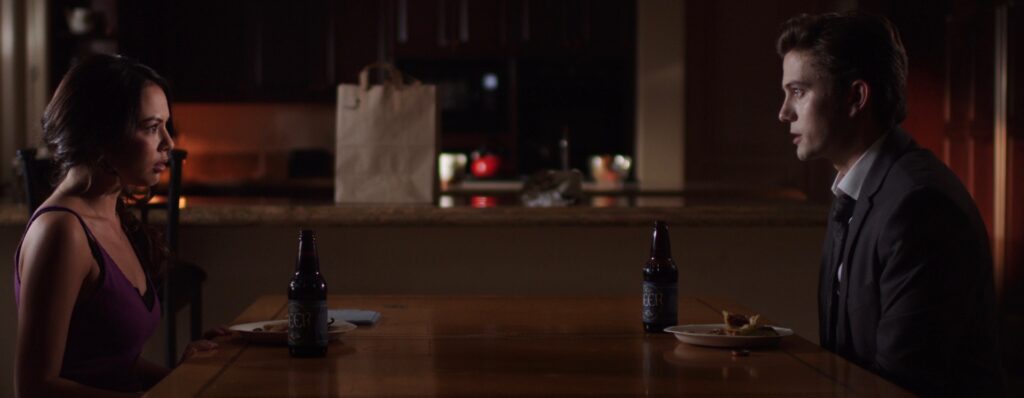April 27, 2022
by Carla Hay

Directed by Pece Dingo
Culture Representation: Taking place in Los Angeles, the dramatic film “Until We Meet Again” features a cast of predominantly white characters (with a few Asians and African Americans) representing the working-class, middle-class and wealthy.
Culture Clash: A singer/songwriter moves into a haunted mansion, where she falls in love with the ghost of the famous pianist who used to live there.
Culture Audience: “Until We Meet Again” will appeal primarily to people interested in watching morbid and wretchedly made ghost romance movies.

It would be a disservice to call “Until We Meet Again” a “train wreck,” because train wrecks get people’s attention and need energy to exist. “Until We Meet Again” is just lethargic mush about a creepy romance between a male ghost and a desperate woman. Aside from the morbid aspects of this terrible movie, “Until We Meet Again” fails to be entertaining on any level whatsoever. Everyone involved in making “Until We Meet Again” should be embarrassed, but this garbage movie is such a flop, hardly anyone will see it.
Written and directed by Pece Dingo, “Until We Meet Again” (which takes place in Los Angeles) also has an awkwardly matched cast that lacks realistic chemistry with each other. The cast members in “Until We Meet Again” just recite their lines, with no credible emotional connection to their characters. The characters that are supposed to have relationships with each other never look convincing as people in relationships, whether they are supposed to be friends or lovers.
Lisa Wagner (played by Janel Parrish) is a 21-year-old pop singer/songwriter, who’s struggling to make it big in the very competitive music industry. The most she’s been able to accomplish is to get occasional gigs at small nightclubs. In the beginning of the movie, she’s part of a musical duo with her guitarist boyfriend Shane (played by Justin Gaston), who soon becomes her ex-boyfriend.
While Shane and Lisa are doing a very unimpressive and bland performance on stage, Lisa notices that Shane and a woman in the audience are lustfully looking at each other. After the show, Lisa sees Shane and this mystery woman (played by Erin Boehme) kissing each other passionately in a car in the nightclub’s parking lot. That’s the end of Lisa’s relationship with Shane, who pops back up occasionally in the movie to harass Lisa to get back together with him. Lisa refuses.
After this breakup, an emotionally wounded Lisa ends up housesitting at a Hollywood Hills mansion for an unnamed period of time. Details on who owns the mansion are never fully explained. Lisa vaguely mentions that she answered an online ad to housesit for a woman whom Lisa does not know. There are many unexplained and sloppily written aspects of “Until We Meet Again.”
Getting to live in this mansion is one of the few bright spots in Lisa’s life. Another bright spot is her best friend Tiffany (played by LeToya Luckett), who is the first person Lisa invites over to the house to show where she is currently living. Lisa says if it weren’t for this housesitting job, she would never have been able to afford to live in a place like this mansion. As an added perk for Lisa, the house has a grand piano that Lisa will play several times during the course of the movie.
Lisa tells Tiffany, who’s also single, that although Lisa was upset by Shane’s infidelity and having to break up with him, Lisa says she was never really in love with Shane, so it was probably all for the best that she and Shane are no longer a couple. To celebrate Lisa’s new living situation, Lisa and Tiffany smoke some synthetic marijuana (also known as spice) together. This drug activity is something that will be a factor later in the story when Lisa calls the police after she thinks a ghost in the mansion is stalking her.
On her first night in the house, Lisa sees a mouse and predictably screams. The next day, she sees the mouse again, so she calls an exterminator service. Two elderly men show up at her door. Their names are Louie (played by Antonio Fargas) and Angel (played by Leslie Jordan), who say they are “pest eradicators.”
Angel, who is feisty and sarcastic, seems to be the one in charge. Louie is more laid-back than Angel, but he and Angel seem to get on each other’s nerves. They also have an odd way of inspecting the house for animal pests. Louie uses a doctor’s stethoscope to listen to the walls, while Angel takes notes on a clipboard.
Louie announces to Lisa: “You’ve got a big rodent problem here ma’am. ” Angel then chimes in, “I’m sure it’s nothing we can’t handle.” Louie and Angel then start bickering with each each other. Lisa overhears Angel tell someone in the room, “There’s nothing for you here, except to bother the girl.”
If all of this sounds like a very dull scene, that’s because it is, but it’s intended to be one of the movie’s comedic moments, because Louie and Angel are supposed to be the “comic relief” characters. Viewers should actually dread seeing Louie and Angel in a scene because these two characters are painfully unfunny. The dialogue throughout this movie is simply empty and horrendous.
As an example of how this movie is badly written, Lisa never bothers to get details on what kind of extermination these two miserable clowns are supposed to be doing before they leave the house. Of course, it’s easy to figure out from the strange way that Louie and Angel are acting, they’re not really exterminators. (Angel’s name is a big, glaring clue that this dimwitted movie serves up with no subtlety.)
Lisa soon finds out that she’s got a bigger problem in the house than a random mouse: The house is haunted by a mopey ghost named Eddie Conway (played by Jackson Rathbone), a famous pianist who died in 1969, at the age of 20. Lisa first sees Eddie sitting at the end of her bed before he disappears. Lisa doesn’t know who he is at first, but she eventually finds out his identity. She not only discovers that Eddie used to live in this mansion but she also finds out something about his past love life that leads to a very cringeworthy part of the movie.
The first time that Lisa sees Eddie, she’s shocked and frightened. A panicked Lisa calls the police to report an intruder. The cops who show up to take the report are Detective Morrison (played by Michael Madsen) and Detective Yamamoto (played by Anzu Lawson), who don’t find anything suspicious and can’t do anything to help Lisa except take her statement. Detective Morrison is more skeptical than Detective Yamamoto.
Lisa encounters these two cops multiple times when she calls the police after seeing Eddie in her home again. And each time, the police get more suspicious that Lisa is hallucinating, because they think she’s on drugs and/or mentally ill. It doesn’t help when Detective Morrison finds Lisa’s stash of spice, which she promptly denies is hers.
In between these “ghost encounters” with Eddie and Lisa, “Until We Meet Again” has some tedious scenes of Lisa trying to get a record deal. The more she sees Eddie and the more she gets to know him (they eventually start talking to each other), the more she starts to fall for him and vice versa. And you can almost do a countdown to the scene where Eddie and Lisa start writing songs together.
Angel and Louie show up from time to time (much to Eddie’s displeasure), because Angel and Louie are on a mission to get Eddie to go somewhere with them. Eddie likes hanging out at the house, and he doesn’t want to leave. And besides, he’s got a romance going on with a living, breathing human being.
Shouldn’t Angel and Louie know the silly romance movie rule by now that a mismatched couple in love cannot be stopped? In a nonsensical movie like “Until We Meet Again,” that means Eddie and Lisa have got to find a way to make this love connection work between a ghost and a human who’s still alive. The rest of “Until We Meet Again” pummels viewers with this attitude: “So what if someone in this couple is literally dead? Is there a law against having sex with a ghost? Take that, Detective Morrison!”
By falling in love with each other, Lisa and Eddie are supposed to find happiness from the heartbreak they had before they met each other. It’s all handled in a way that’s not only off-putting but also incredibly slow-paced and dreary. Eddie and Lisa’s ghost/living person romance isn’t the only thing that looks fake. The characters of Eddie and Lisa do not look like their stated ages in the movie. Rathbone (wearing ashy white makeup) and Parrish are supposed to be portraying people in their early 20s, but Rathbone and Parrish look a least 10 years older than that.
Simply put: Everything about “Until We Meet Again” is a misfire. The direction is amateurish, the screenplay is horrible, the acting is weak and sometimes unwatchable. The only good thing to say about this odious movie is it’s such a turnoff, there’s no chance that there will be a sequel.
1091 Pictures released “Until We Meet Again” on digital and VOD on February 15, 2022.


